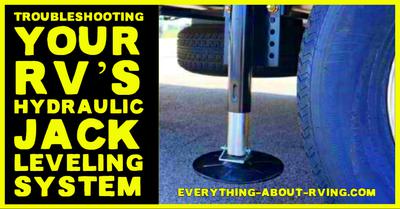RV Leveling System Not Working
Dealing with an RV leveling system not working can be a frustrating experience for any RV owner. A functioning leveling system is essential for ensuring stability and comfort during your travels, especially when parking on uneven terrain. Whether your RV uses a hydraulic, electric, or manual leveling system, problems can arise that leave you stuck in an inconvenient situation. When your RV leveling system is not working as expected, troubleshooting the issue becomes necessary to avoid further damage and to ensure that you can enjoy your trip with peace of mind.
Common Problems with RV Leveling Systems
There are several reasons why an RV leveling system may stop working. Understanding these common issues can help you quickly diagnose the problem and determine the best solution. One of the most frequent problems is related to power. If your leveling system is not responding at all, the first thing to check is whether it is receiving power. A blown fuse, low battery voltage, or disconnected wiring can prevent the system from functioning.
Hydraulic leveling systems, which rely on hydraulic fluid to extend and retract jacks, can also experience problems if there’s a leak in the hydraulic lines or a drop in fluid levels. A leaking system may cause the jacks to extend unevenly or fail to hold the RV in place. Meanwhile, electric leveling systems can face motor issues or problems with the control panel, where electrical components may malfunction over time.
Troubleshooting an RV Leveling System
When your RV leveling system is not working, the first step is to identify whether the issue is mechanical or electrical. Start by checking the power supply. If the system is entirely unresponsive, inspect the battery and fuses. Ensure that the RV’s battery is fully charged and that the fuses connected to the leveling system are intact. If you discover a blown fuse, replacing it may resolve the issue. Also, examine the wiring for any signs of damage or loose connections that might prevent the system from operating correctly.
For hydraulic leveling systems, check the fluid levels in the reservoir. If the fluid is low, it can prevent the jacks from extending or retracting properly. You’ll also want to inspect the system for any visible leaks, as these can signal more serious problems that require professional attention. Topping up the hydraulic fluid may restore functionality, but persistent leaks should be addressed by a certified mechanic.
In the case of electric leveling systems, a malfunctioning control panel can be the root cause of the issue. If the control panel fails to engage the jacks or displays error messages, resetting the system might help. Many leveling systems have a manual override option that allows you to extend or retract the jacks manually in the event of a system failure, which can be a temporary solution until the electrical issue is resolved.
Preventative Maintenance for RV Leveling Systems
To avoid problems with your RV leveling system, routine maintenance is key. For hydraulic systems, regularly check fluid levels and inspect for leaks, as these can cause long-term damage if left unchecked. Clean the jacks and lubricate them as needed to ensure smooth operation. Electric systems benefit from keeping the control panel and motor components clean and free of moisture, which can lead to electrical shorts.
In addition, running periodic system checks before embarking on a trip can help you catch any potential issues before they become major problems. This proactive approach ensures that your RV leveling system stays in optimal working condition, reducing the risk of being stuck with a non-functional system while on the road.
Conclusion
When your RV leveling system is not working, troubleshooting and performing regular maintenance are essential steps to resolve the issue. By understanding the common causes of system failure and taking preventive measures, you can ensure that your RV stays level and secure during your travels. Whether the problem is electrical or mechanical, addressing it early can save you time and hassle, allowing you to enjoy a worry-free camping experience.


WhatsApp网页版登录
Informative content articles may be boring, but you have changed that concept around. This particular is quite intriguing and the content is simply astounding. I personally like it. Keep up the exceptional work.
telegram下载
It’s really a refreshing move for me to discover this type of well-written post. Lately, I’ve discovered it to be difficult to find comparatively decent articles on this specific subject. Thank you for being a fine author.
wps
I couldn’t stop looking over this write-up. It is not only interesting, it is created in a simple to comprehend fashion. Many thanks for the decent work!
wps官网
Many thanks for writing this excellent premium quality write-up. The info in this content confirms my viewpoint and you also genuinely laid it out very well. I could never have created a post this fine.
telegram电脑版
Gorgeous writing! You have hit the nail on the head along with your viewpoints in this post. I think you did an exceptional work with this particular.
Halaman WhatsApp Web
Many thanks for giving this sort of quality content material. I am really satisfied regarding how you can compose your content in such a fascinating fashion.
WhatsApp网页版
It’s not typical for me personally to love reading as much as I did your current article. This specific is actually fascinating information and I am in agreement with you.
WhatsApp网页版
Just how you managed to turn an educational write-up into a fascinating piece of content is actually beyond me personally, nonetheless you did it successfully. I am truly pleased with your job. I personally accept the majority of this information.
wps
This article is a unique wealth of educational info that is interesting and very well composed. I personally compliment your own effort on this specific and thank you for this info. You have got what it takes to get focus.